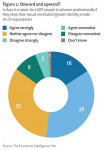Companies are making painful choices in order to grow during the recession, says new report
Companies will continue to face challenges in the near term. The Economist Intelligence Unit forecasts a slow recovery for the global economy through 2013, although performance will vary by region and industry. The economies of North America and Western Europe will slowly expand, not topping 2% GDP growth until 2013. Latin America and the transition economies in Central and Eastern Europe will pick up in 2011, and the Middle East and North Africa will experience a somewhat stronger rebound, starting in 2010. Emerging Asia will be the fastest-growing region in 2010-13, led by India and China. Globally, banking, construction and the automotive sector are likely to be severely battered, but digital technology and low-carbon businesses will probably benefit from the changing business environment.
Firms that had put their financial houses in order before the recession are best positioned to grab market share during the downturn. The severe credit crunch that characterised the start of the current crisis crippled companies whose growth strategies depended on heavy borrowings. Companies that have cash on hand can go on the offensive, taking market share from more vulnerable competitors. The location of companies’ operations also can affect their access to financing—banks in south-east Asia, for example, were less affected by the credit freeze.
“A purely defensive strategy might seem most appropriate to ensure short-term survival, but it is unlikely to produce long-term growth,” says Katherine Dorr Abreu, senior editor at the Economist Intelligence Unit. “In their planning, companies must take account of changes in the relative positions of economies and industries as a result of the recession, and also the opportunities to change their position within their sector.”
Other findings of the study include:
· Flexibility is vital for companies to reposition themselves for new markets and new customers. Successful companies are using information about their customers, often already available in the firm, to pinpoint areas of possible growth and reposition themselves and their products. They are resizing their offerings in order to reduce prices, changing their product mix to appeal to local rather than global markets, or shifting their targets from the developed to the emerging markets.
· Constant innovation is required, even in the most turbulent times. There are limits to what can be done with existing products, and companies that can afford to are continuing to innovate as part of their growth strategy. Indeed, in all of the companies interviewed, innovation programmes, which increase a firm’s flexibility, have been spared the knife.
· A downturn encourages firms to cut non-strategic areas and focus on higher priorities. Many companies are spending money to gain advantage, but they are cutting in less important areas or where efficiencies have been identified. Trimming unpromising products or divisions, reining in a salary structure that has ballooned out of control, abandoning markets with no growth potential—all are more palatable to stakeholders when they are seen as part of a well-considered response to a crisis.
웹사이트: http://www.eiu.com
연락처
Joanne McKenna
Press Liaison
+44 (0)20 7576 8188
이메일 보내기
이 보도자료는 Economist Intelligence Unit가(이) 작성해 뉴스와이어 서비스를 통해 배포한 뉴스입니다.




